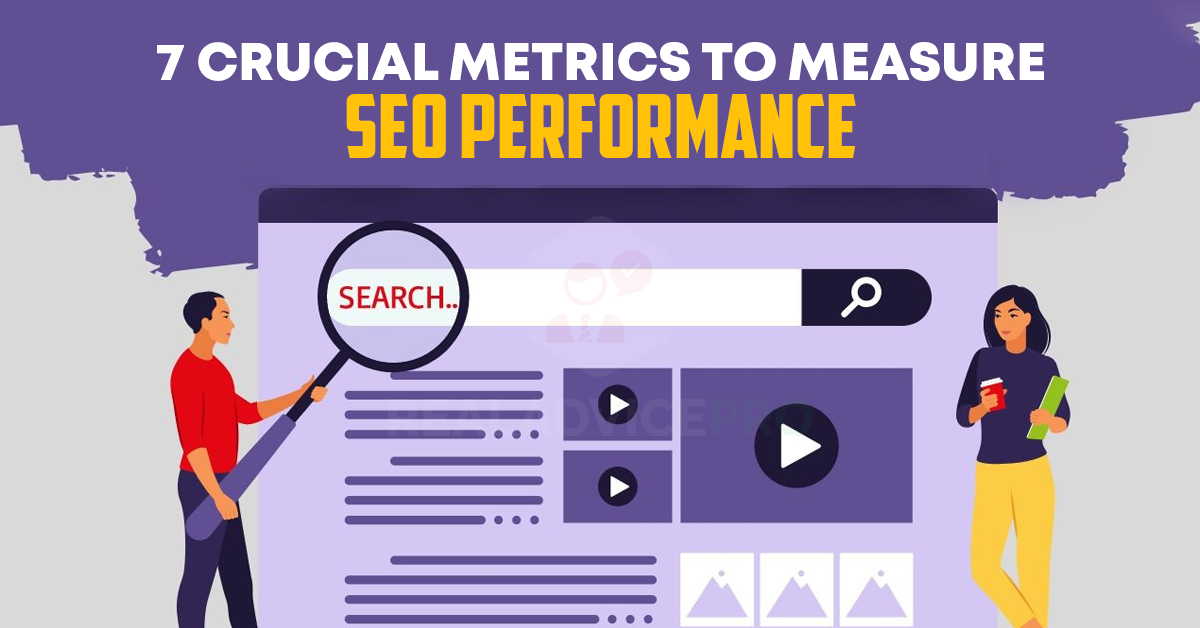SEO performance tracking is crucial in this ever-competitive world of online presence. SEO or Search engine optimization is the ongoing process of improving your site’s visibility to attract more organic traffic.
To improve your website and make necessary changes, it is crucial to know how good or bad your website is. but how exactly do you track your SEO efforts? This blog will help you dive into 7 key metrics that will help you track your SEO performance and optimize your website for search engine dominance.
Crucial Metrics To Measure SEO Performance
Table of Contents
1. ORGANIC TRAFFIC

The first key metric for measuring SEO performance is Organic traffic. Very underrated but super important to note. This refers to the total number of visitors who land on your website from unpaid search results.
It’s a foundational metric because it directly reflects how well your SEO efforts are driving visitors to your site through organic search. Just think of it as the raw number of people your SEO strategy is attracting. By tracking organic traffic over time, you can see if your SEO efforts are paying off and bringing in more visitors.
2. KEYWORD RANKINGS

The second SEO metric on our list is Keyword rankings. This one focuses on how your website ranks for specific keywords that users search for on search engines. Keywords are the terms and phrases people use to find information online, and ranking high for relevant keywords is crucial for attracting targeted organic traffic. Imagine keyword rankings as your position in a race.
The higher you rank for a particular keyword, the closer you are to the front page of the search results, where most users click while searching for something.
By tracking your keyword rankings over time, you can see if your strategy is moving up the search engine results pages (SERPS) for important keywords. This helps you identify which keywords are working well and which ones might need further optimization to improve your ranking and drive more relevant traffic.
3. IMPRESSIONS

The third SEO metric to track for your SEO performance is impressions. This metric counts the number of times your website appears in search results for a given period. it’s like a gauge for how visible your website is within the search engine landscape.
The more impressions you gain, the more people are likely to see your website in search results, even if they don’t click on it. an increase in impressions means that your SEO efforts are paying off, making your website more discoverable by search engines. This can be a leading indicator of future organic traffic growth, as more people become aware of your website’s existence in the search results for relevant keywords.
4. CLICK THROUGH RATE (CTR)

The fourth metric for SEO performance is Click-through rate (CTR). This metric dives deeper than impressions to measure how effective your website listings are at enticing users to click. it’s calculated as the percentage of people who see your website in the search engine results pages (SERPs) and then click on it.
High CTR means your SEO efforts are creating clear and enticing website listings that grab users’ attention and encourage them to visit your site while Low CTR might suggest your website titles and descriptions need improvement. they might not be clear, relevant to the keywords, or engaging enough to make users click.
5. CONVERSIONS

The fifth one is Conversions. This goes beyond just attracting visitors and focuses on the ultimate goal of SEO: Getting those visitors to take a desired action to your website. Whether it’s signing up, downloading something, or subscribing to a particular newsletter. The meaning of conversions can be different for everyone in different cases.
Conversions can vary depending on your website’s purpose, but some common examples include E-commerce, lead generation, service business, and blog. think of conversions as the gold medals in the SEO Olympics.
They represent the most valuable outcome of your SEO efforts which is turning visitors into paying customers, leads, or engaged users. This allows you to filter the strategy that you’re using to target users who are more likely to convert and achieve your business goals.
6. BACKLINKS

The sixth point is Backlinks. These are essentially links from other websites that point back to your website. In the world of SEO, Backlinks act like votes of confidence for search engines. The more high-quality backlinks you get, the more authoritative and trustworthy your website appears in the eyes of search engines, which can significantly influence your ranking.
Backlinks from reputable websites signal to search engines that your website offers valuable content and deserves a higher ranking in the search results. by tracking the quality of your backlinks, you can see how well your SEO strategy is building your website’s authority and niche.
This allows you to focus on acquiring backlinks from high-quality websites to improve your search engine ranking and attract more organic traffic.
7. BRAND MENTIONS

The seventh and last SEO metric for SEO performance, which is not directly an important search engine metric, is brand mentions.
This metric focuses on how often your brand is mentioned online, regardless of whether it’s linked back to your website or not. it provides valuable insights into the overall online visibility and brand awareness generated by your SEO efforts.
While the brands mentioned don’t directly impact search engine rankings, they offer valuable insights into the broader impact of your SEO strategy. These valuable insights play an important role in tracking performance- they’re more crucial than you think. You can see how your SEO efforts are contributing to your overall online branding and brand awareness by tracking brand mentions.
Conclusion
And that’s all! Tracking SEO performance is crucial for every business because it tells you how well your efforts are paying off in digital media.
Tracking SEO performance and SEO metrics is surely a must-do! Hope this blog gives you an idea of exactly what to track and why it is important to do so. If you liked this blog, make sure to check our digital marketing-related blog where we have provided you with more knowledge.






